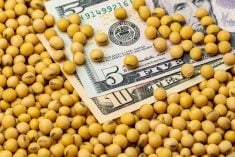Chicago | Reuters — Chicago Board of Trade corn and soybean futures fell on Monday, retreating from gains made during the overnight trading session on signs that already light export demand for U.S. supplies had weakened further, traders said.
Wheat futures were firm, with the biggest gains being notched by K.C. hard red winter wheat and MGEX spring wheat contracts due to tight global stocks of high protein offerings and concerns about dry weather limiting the size of the crop in key growing areas of Europe and the Black Sea region.
Read Also

U.S. grains: Soybean prices rise as China-U.S. truce assessed
Chicago soybean prices rose on Wednesday, recovering some of the previous session’s losses, as Beijing’s confirmation that it was cutting tariffs on U.S. farm goods put attention back on a trade truce between the countries.
Corn futures posted the biggest declines, sinking nearly 1.9 per cent.
“The export side of corn remains a gaping, sucking chest wound,” Marex Capital analyst Charlie Sernatinger said in a note to clients.
Traders shrugged off the potential impact that hot and dry weather in the U.S. Midwest might have on the recently seeded crop.
“I think we are still early enough that it is not irreversible damage being done yet,” said Mark Schultz, chief market analyst at Northstar Commodity.
The U.S. Agriculture Department said on Monday that weekly export inspections of corn fell to 1.180 million tonnes from 1.346 million tonnes the prior week.
CBOT July corn futures settled down 11-1/2 cents at $5.97-1/2 a bushel. The contract hit a six-week high before turning lower (all figures US$).
CBOT July soybean futures were down 2-1/2 cents at $13.50 a bushel.
Soybean export inspections were reported at 214,247 tonnes, down 11.9 per cent from a week earlier.
CBOT July soft red winter wheat ended up five cents at $6.24 a bushel, with K.C. hard red winter wheat contracts and MGEX spring wheat contracts posting bigger gains.
USDA said on Monday afternoon after the close that 64 per cent of the U.S. corn crop was rated good to excellent as of June 4, down five percentage points from a week earlier.
The soybean crop was rated 62 per cent good to excellent, the winter wheat crop 36 per cent good to excellent and the spring wheat crop 64 per cent good to excellent.
— Reporting for Reuters by Mark Weinraub in Chicago; additional reporting by Michael Hogan in Hamburg and Naveen Thukral in Singapore.










